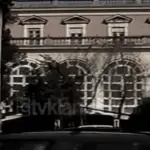 1947 – The LSHA, the League of Writers and Artists of Albania, is founded. LSHA is a non-profit organization created by a group of Albanian writers and artists to promote the literary and artistic creativity of Albanian authors, to appreciate and re-evaluate the best works of Albanian literature, music, painting and sculpture, traditional and contemporary values, and to foster the creativity of young talents. Today LSHA has about 1300 members. Its governing bodies are: The National Congress, the Presidency, the President and the Administrative Council. In the organizational structure function: the section of literature, music, painting and sculpture and that of young talents. For more than 60 years of its history, the League of Writers and Artists of Albania has been run by prominent personalities of our culture. Its presidents were: Sejfulla Maleshova (deceased), Dhimitër Shuteriqi (deceased), Dritëro Agolli (deceased), Bardhyl Londo, Xhevahir Spahiu, Limos Dizdari, Zyhdi Morava (deceased) and Hysen Sinani.
1947 – The LSHA, the League of Writers and Artists of Albania, is founded. LSHA is a non-profit organization created by a group of Albanian writers and artists to promote the literary and artistic creativity of Albanian authors, to appreciate and re-evaluate the best works of Albanian literature, music, painting and sculpture, traditional and contemporary values, and to foster the creativity of young talents. Today LSHA has about 1300 members. Its governing bodies are: The National Congress, the Presidency, the President and the Administrative Council. In the organizational structure function: the section of literature, music, painting and sculpture and that of young talents. For more than 60 years of its history, the League of Writers and Artists of Albania has been run by prominent personalities of our culture. Its presidents were: Sejfulla Maleshova (deceased), Dhimitër Shuteriqi (deceased), Dritëro Agolli (deceased), Bardhyl Londo, Xhevahir Spahiu, Limos Dizdari, Zyhdi Morava (deceased) and Hysen Sinani.
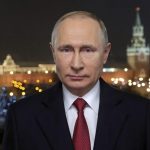 1952 – Russian President Vladimir Putin is born in Leningrad (Saint Petersburg) in the Soviet Union. Putin would lead the Russian state with authoritarian methods from 2000 onwards. He would previously serve as an officer in the KGB (Soviet intelligence service) in Berlin. Vladimir Putin would intervene militarily in Georgia in 2008 and in Ukraine in 2014, facing widespread opposition in international politics, especially in the West. During his presidency Russia would recognize a political, military, and to some extent economic expansion.
1952 – Russian President Vladimir Putin is born in Leningrad (Saint Petersburg) in the Soviet Union. Putin would lead the Russian state with authoritarian methods from 2000 onwards. He would previously serve as an officer in the KGB (Soviet intelligence service) in Berlin. Vladimir Putin would intervene militarily in Georgia in 2008 and in Ukraine in 2014, facing widespread opposition in international politics, especially in the West. During his presidency Russia would recognize a political, military, and to some extent economic expansion.
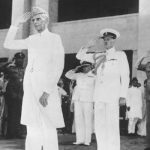 1958 – A coup d’état in Pakistan is overthrown by military forces commanded by General Ayub Khan who overthrew the government of Feroz Khan. At the same time the martial law was declared where the population was subjected to state-siege. The coup was aimed at strengthening the power of President Iskander Mirza. Then everything would go back to normal. What is worth noting is that the coup in Pakistan is among the rarest in the world where no casualties were reported.
1958 – A coup d’état in Pakistan is overthrown by military forces commanded by General Ayub Khan who overthrew the government of Feroz Khan. At the same time the martial law was declared where the population was subjected to state-siege. The coup was aimed at strengthening the power of President Iskander Mirza. Then everything would go back to normal. What is worth noting is that the coup in Pakistan is among the rarest in the world where no casualties were reported.
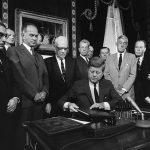 1963 – US President John Kennedy ratifies the Nuclear Non-Proliferation Treaty. 126 UN states have signed the treaty while another 70 have refused to sign it. One of these countries is the People’s Republic of China, which has developed its nuclear program for the last 50 years. This agreement aims that in the future all participating countries in the UN, will not test any nuclear weapons, thus maintaining peace and security around the world.
1963 – US President John Kennedy ratifies the Nuclear Non-Proliferation Treaty. 126 UN states have signed the treaty while another 70 have refused to sign it. One of these countries is the People’s Republic of China, which has developed its nuclear program for the last 50 years. This agreement aims that in the future all participating countries in the UN, will not test any nuclear weapons, thus maintaining peace and security around the world.
 1985 – Four armed terrorists, members of the PLO, take hostage the Italian cruise ship MS Achille Lauro. After four days of negotiations between the terrorists and the Italian government, cruiser Achille Lauro headed to Port Said, Egypt along with the hostages. Subsequently, according to the agreement between official Rome and the Palestinians, 50 of them were released from Israeli prisons. While all hostages can escape with Yugoslav passports in the direction of Tunisia.
1985 – Four armed terrorists, members of the PLO, take hostage the Italian cruise ship MS Achille Lauro. After four days of negotiations between the terrorists and the Italian government, cruiser Achille Lauro headed to Port Said, Egypt along with the hostages. Subsequently, according to the agreement between official Rome and the Palestinians, 50 of them were released from Israeli prisons. While all hostages can escape with Yugoslav passports in the direction of Tunisia.
 1987 – Sikh nationalists in northern India declare independence of the Khalistan region. But this independence was not recognized by any country in the world. The Sikh separatist movement in India, and later in Pakistan, would create a climate of political and ethnic turmoil in these countries. And this as this minority claims to create a state in the part of the Himalayan mountains. Official New Delhi has often acted militarily against them, displacing them beyond its state border.
1987 – Sikh nationalists in northern India declare independence of the Khalistan region. But this independence was not recognized by any country in the world. The Sikh separatist movement in India, and later in Pakistan, would create a climate of political and ethnic turmoil in these countries. And this as this minority claims to create a state in the part of the Himalayan mountains. Official New Delhi has often acted militarily against them, displacing them beyond its state border.
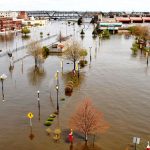 1993 – The famous Mississippi River floods the southern United States after 6 months. The damage from this flood would be estimated at $ 15 billion while the casualties would be 32. The geographical line of the flood would extend over an area of 1200 km in the horizontal line and 700 km in the vertical one. The flooded land area would be 830 thousand square km while another 80 thousand km was severely damaged. This would be one of the worst floods in the region since 1927.
1993 – The famous Mississippi River floods the southern United States after 6 months. The damage from this flood would be estimated at $ 15 billion while the casualties would be 32. The geographical line of the flood would extend over an area of 1200 km in the horizontal line and 700 km in the vertical one. The flooded land area would be 830 thousand square km while another 80 thousand km was severely damaged. This would be one of the worst floods in the region since 1927.
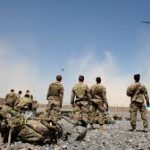 2001 – US military intervention against the Taliban regime in Afghanistan officially begins. In the aftermath of the 9/11 terrorist attacks, the George W. Bush administration, by unanimous decision of the Senate, decided to intervene in this country to overthrow the Taliban regime. At the same time, the US invasion of Afghanistan would mark the beginning of a fierce asymmetric war between Western coalition forces and Al Qaeda terrorist cells. This conflict is still present today.
2001 – US military intervention against the Taliban regime in Afghanistan officially begins. In the aftermath of the 9/11 terrorist attacks, the George W. Bush administration, by unanimous decision of the Senate, decided to intervene in this country to overthrow the Taliban regime. At the same time, the US invasion of Afghanistan would mark the beginning of a fierce asymmetric war between Western coalition forces and Al Qaeda terrorist cells. This conflict is still present today.
 2006 – Russian journalist, writer, and activist Anna Politkovskaya dies in Moscow at the age of 48. She was shot dead in the elevator of her apartment by unknown killers. Politkovskaya, would become known for her harsh criticism of Russian President Vladimir Putin. She would closely monitor the Russo-Chechen conflict and that in Transcaucasia. Politkovskaya’s death would correspond to Putin’s birthday in Moscow. Many Russian and Western analysts accused the official Kremlin of being behind its elimination.
2006 – Russian journalist, writer, and activist Anna Politkovskaya dies in Moscow at the age of 48. She was shot dead in the elevator of her apartment by unknown killers. Politkovskaya, would become known for her harsh criticism of Russian President Vladimir Putin. She would closely monitor the Russo-Chechen conflict and that in Transcaucasia. Politkovskaya’s death would correspond to Putin’s birthday in Moscow. Many Russian and Western analysts accused the official Kremlin of being behind its elimination.
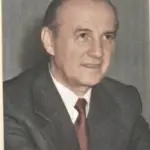 2011– Ramiz Tafë Alia, one of the most important figures of the Albanian Labor Party, who led Albania between 1984-1990 and president of the republic, dies. Alia is included in the list compiled by the Institute for the Study of the Crimes and Consequences of Communism, which summarizes the participants who have direct responsibility for the crimes of the Albanian Communist Party and the National Liberation Army, being, according to law no. 41, members of political and military structures “who have inspired, organized, ordered, executed or assisted partisan forces in criminal acts”. After the death of Enver Hoxha he was the first secretary of the Central Committee of the Labor Party. In December 1990 the regime faced student protests. Alia met with students and young people and in the New Year message for the Albanian people welcomed the changes that were happening in the country. After the first multi-party elections in Albania held on March 31, 1991, the new pluralist parliament dominated by the deputies of the ALP, on April 30, 1991, on the proposal of the ALP, elected Ramiz Alia as President of the Republic. With the fall of the coalition government in December 1992 and the Democratic Party of Albania reaping a landslide victory in the spring 1992 general elections, he resigned as president on April 3, 1992. On April 9, the People’s Assembly elected the DP leader. Sali Berisha as the new head of the Albanian state. On September 12, 1992 he was placed under house arrest and a year later he was arrested. After suffering from a traffic accident in the lungs (pulmonary trenboembolism) he died in the sanatorium hospital of Tirana. With his death closes an era he was the last communist president and the first pluralist.
2011– Ramiz Tafë Alia, one of the most important figures of the Albanian Labor Party, who led Albania between 1984-1990 and president of the republic, dies. Alia is included in the list compiled by the Institute for the Study of the Crimes and Consequences of Communism, which summarizes the participants who have direct responsibility for the crimes of the Albanian Communist Party and the National Liberation Army, being, according to law no. 41, members of political and military structures “who have inspired, organized, ordered, executed or assisted partisan forces in criminal acts”. After the death of Enver Hoxha he was the first secretary of the Central Committee of the Labor Party. In December 1990 the regime faced student protests. Alia met with students and young people and in the New Year message for the Albanian people welcomed the changes that were happening in the country. After the first multi-party elections in Albania held on March 31, 1991, the new pluralist parliament dominated by the deputies of the ALP, on April 30, 1991, on the proposal of the ALP, elected Ramiz Alia as President of the Republic. With the fall of the coalition government in December 1992 and the Democratic Party of Albania reaping a landslide victory in the spring 1992 general elections, he resigned as president on April 3, 1992. On April 9, the People’s Assembly elected the DP leader. Sali Berisha as the new head of the Albanian state. On September 12, 1992 he was placed under house arrest and a year later he was arrested. After suffering from a traffic accident in the lungs (pulmonary trenboembolism) he died in the sanatorium hospital of Tirana. With his death closes an era he was the last communist president and the first pluralist.






